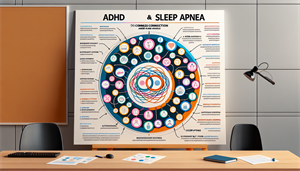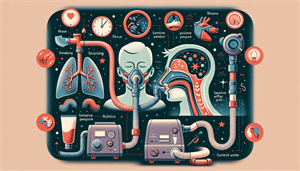
ADHD and Sleep Apnea
Navigating the challenges of ADHD can be complicated, especially when sleep issues like sleep apnea enter the mix. Could your sleep apnea be misunderstood as ADHD symptoms, or is one condition worsening the other?
This article aims to clarify the link between ADHD and sleep apnea, offering insight into their shared symptoms, the potential for misdiagnosis, and how treatment can address both conditions.
Get ready to understand the essentials and pave the way for better management of your health.
Key Takeaways
There is a significant overlap between ADHD and sleep apnea, with symptoms such as difficulty concentrating, forgetfulness, and mood swings appearing in both, leading to challenges in accurate diagnosis and potential for misattribution of symptoms.
Treatment strategies for those suffering from both ADHD and sleep apnea include lifestyle changes such as weight loss and regular exercise, use of medication, and behavioral therapies, which together can manage symptoms and enhance quality of life.
Accurate diagnosis of sleep apnea in individuals with ADHD is essential and can involve home sleep tests and professional evaluations, highlighting the importance of considering both conditions when addressing sleep-related symptoms and cognitive impairments.
Exploring the Overlap: ADHD and Sleep Apnea
The intriguing connection between ADHD and sleep apnea exhibits a significant overlap. A 2019 study discovered that 19.1% of people with obstructive sleep apnea were found to have ADHD. This overlap is more than a mere coincidence and can pose challenges during diagnosis due to similar symptomatic presentations.
The potential for misdiagnosis arises when symptoms of sleep apnea like difficulty concentrating, forgetfulness, and mood swings are mistaken for ADHD symptoms. Additionally, sleep disordered breathing, a characteristic of sleep apnea, can further complicate the differentiation process.
The impact of poor sleep quality due to sleep apnea can exacerbate ADHD symptoms, such as inattention and hyperactivity. In fact, sleep problems are often overlooked during routine ADHD assessments, despite their significant impact on life quality.
Defining ADHD and Its Symptoms
Attention deficit hyperactivity disorder (ADHD), a neurodevelopmental disorder, is characterized by inattention, hyperactivity, and impulsivity. People with ADHD often struggle with focusing on tasks, staying still, or controlling impulsive behavior. These symptoms can significantly affect a person’s daily life, including their performance at school or work, relationships, and self-esteem.
Contrarily, sleep apnea is a sleep disorder that manifests through repeated pauses in breathing during sleep.
These interruptions in breathing can lead to poor sleep quality and daytime sleepiness, which can impact overall health and well-being. Interestingly, individuals with ADHD commonly experience sleep problems, which are often overlooked during diagnosis. Considering both conditions when evaluating symptoms is therefore vital.
Understanding Sleep Apnea and Its Indicators
Sleep apnea is a prevalent sleep disorder characterized by: interruptions in breathing or shallow breathing during sleep, affecting sleep apnea sufferers with untreated sleep apnea loud snoring compromised sleep quality and fragmentation daytime sleepiness difficulty concentrating forgetfulness These symptoms can significantly overlap with those of ADHD, leading to potential misdiagnosis.
Further, delayed sleep phase syndrome, another sleep disorder, can coexist with ADHD. This condition, characterized by a delay in the sleep-wake cycle, can further complicate the diagnosis and treatment process. A comprehensive understanding of sleep apnea and its indicators proves critical for ensuring accurate diagnosis and effective treatment.
The Symptomatic Confusion: Shared Signs of ADHD and Sleep Apnea
ADHD and sleep apnea share several symptoms, including difficulty concentrating, forgetfulness, and mood swings. These shared signs can lead to potential misdiagnosis and challenges in accurately identifying the underlying condition.
It is essential to consider both ADHD and sleep apnea when evaluating symptoms to ensure that individuals receive the appropriate diagnosis and treatment for their specific needs.
By understanding the overlap and shared signs of these conditions, healthcare professionals can provide comprehensive care that addresses both ADHD and sleep apnea, improving the overall well-being of patients.


